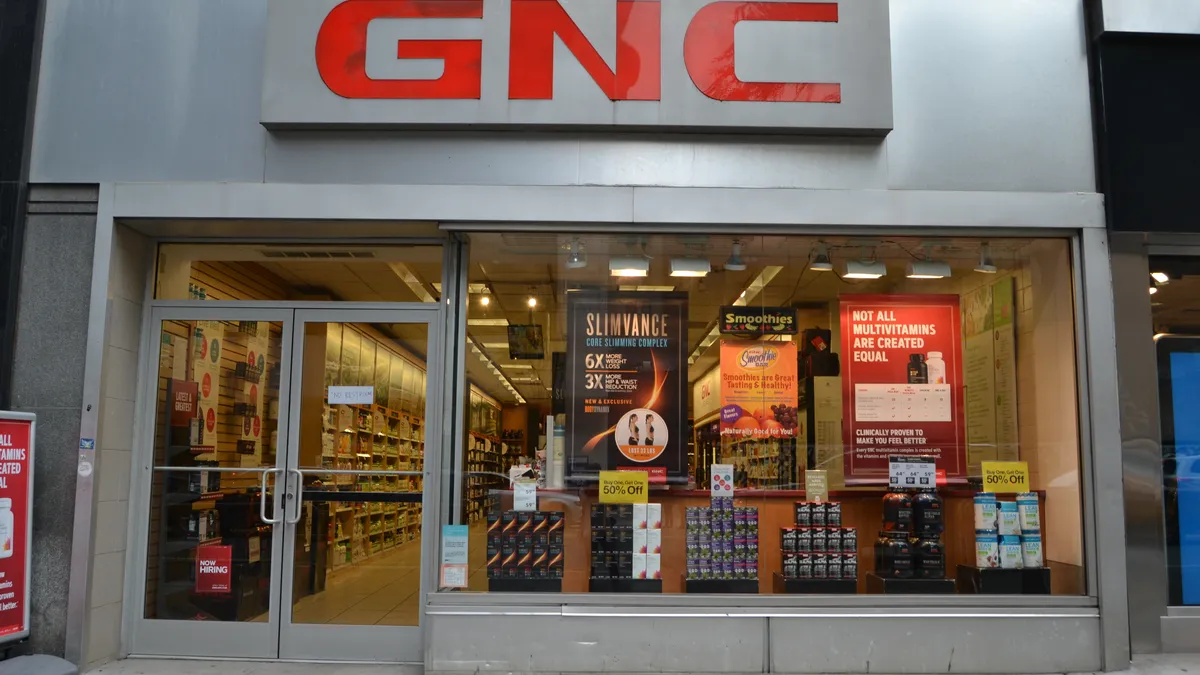Dive Brief:
- GNC canceled a bankruptcy auction for its business this week, the nutrition supplement retailer said in a court filing.
- GNC is moving forward with a sale to Harbin Pharmaceutical Group, its largest investor and partner with GNC in a joint venture in China.
- Harbin made a $760 million stalking horse bid for GNC following the retailer's bankruptcy filing. GNC said it received no other qualified bids by its deadline. A court hearing to consider approval of the sale is scheduled for Thursday.
Dive Insight:
GNC is one of the lucky ones. It entered Chapter 11 with a sale agreement, and is likely to leave bankruptcy whole, if smaller.
This all follows years of distress, with the company trying to manage a debt load, in part leftover from multiple private equity acquisitions, as well as a massive store base, much of it tied to traditional malls.
GNC's history goes back to the mid-1930s. Back then it was a health food store that specialized in yogurt, which was new to the U.S. at the time. Since then it has survived multiple economic downturns and various other calamities, while expanding into its own branded supplements and building a dense store base.
Early this year, the company signaled that it might not be able to generate enough cash from its operations to make payments on a portion of its debt. That disclosure followed five straight years of revenue decline and profit losses in three of the past five years.
And all of that was before COVID-19 forced many of its stores to close. (The retailer tried to stay open where it could under regulations around essential retail.) In April and May, during the closure period and a time of deep uncertainty among consumers and retailers, sales fell up to 60% at GNC's brick-and-mortar stores, the retailer's CFO said at the time of its bankruptcy filing.
Bankruptcy gives GNC a chance to ease its balance sheet and pare back its footprint. The company lists 5,200 retail locations in the U.S. (a figure that includes around 1,600 store-within-a-store locations at Rite Aids). It has said previously that it could close between 800 and 1,200 stores in Chapter 11.
GNC's sale to the China-based Harbin requires court approval. Because Harbin is foreign-owned, it could also be subject to government scrutiny. U.S. Republican Sen. Marco Rubio has pressed for a review of the deal. Last week, Rubio issued a letter to U.S. Treasury Secretary Steven Mnuchin asking that the Committee on Foreign Investment in the United States, a group of executive agencies that review foreign investments in U.S. companies for possible national security risks, take a look at the deal. Rubio was principally concerned with the impact on "sensitive American personal data."
"The acquisition of a major health and nutrition chain with over 5,200 retail stores in the United States and an expansive customer base presents the opportunity for state-directed actors to purchase this information legally," Rubio said in a statement. "Efforts to obtain personal and sensitive data related to health information and financial transactions of U.S. persons must be reviewed with an understanding of the malign foreign policy and intelligence aims of the Chinese government and Communist Party."
















